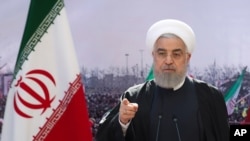The U.S. said Thursday that it would welcome an invitation to talks about a deal made with Iran in 2015, a deal Washington withdrew from during the Trump administration.
How has Iran responded to the news?
Iranian Foreign Minister Mohammad Javad Zarif, in a Twitter post, urged the U.S. to stop “putting onus on Iran,” and instead bring “an end to Trump’s legacy of #EconomicTerrorism against Iran.” Iran wants the U.S. to remove Trump’s sanctions next week. If not, the Middle Eastern country has threatened to ban short-notice inspections by the U.N. nuclear watchdog.
What is the JCPOA?
The Joint Comprehensive Plan of Action, or JCPOA, was formed in July 2015. The five permanent members of the U.N. Security Council (Britain, China, France, Russia and the United States) plus Germany agreed with Iran to a landmark deal to prevent Tehran from building a nuclear weapon. In exchange, certain international sanctions that had been in place against Iran for years would be lifted.
The sanctions relief led to Iran's receipt of billions of dollars in funds that had been frozen and opened its markets back up to many foreign investors.
The deal took years to negotiate and was endorsed by a U.N. Security Council resolution, solidifying it as international law. It went into effect in January 2016.
Inspectors from the U.N. nuclear watchdog, the International Atomic Energy Agency, or IAEA, are in charge of monitoring Iran's compliance.
Why did the U.S. leave the JCPOA?
In 2018, U.S. President Donald Trump removed the U.S. from the JCPOA, which had been a major diplomatic achievement of his predecessor, Barack Obama. Trump called the agreement “a horrible one-sided deal that should have never, ever been made.”
What has Iran been doing?
In 2019, after the U.S. began reimposing sanctions on Iran, Tehran began breaking its adherence to the accord, insisting its accelerated nuclear program was only for peaceful energy purposes.
What is Biden's approach?
On Thursday, Secretary of State Antony Blinken said that the Biden administration would reenter talks about the JCPOA with Iran and the other nations that negotiated the original agreement.
“The United States would accept an invitation from the European Union High Representative to attend a meeting of the P5+1 and Iran to discuss a diplomatic way forward on Iran’s nuclear program,” State Department spokesperson Ned Price said.
Such a meeting has not yet been organized, but it’s expected to be announced following a meeting between Blinken and his French, German and British counterparts.
Biden, who was vice president when Barack Obama’s administration negotiated the deal in 2015, indicated during his campaign that he would seek to rejoin the agreement.
What was Trump's approach?
During Donald Trump’s campaign for president, he repeatedly disparaged the Iran nuclear deal, as the JCPOA is known. In 2018, he upheld a promise to withdraw the United States from the agreement and reimpose sanctions on Iran.
As Iran increased its enrichment of uranium, the Trump administration increased sanctions. In September 2020, the administration imposed sanctions on 27 individuals and entities it said were connected to Iran’s nuclear weapons program.
What is the international approach?
France, Germany and Britain all welcomed the prospect of the United States reentering the agreement during a meeting of foreign ministers Thursday.
But all of the countries are wary of the tough path ahead because Iran is currently in breach of the agreement.
Since Trump left the agreement and Iran began enriching more uranium than is allowed under the JCPOA, countries have faced increasing pressure from Iran to provide more incentives to curb its nuclear enrichment.
What is at stake?
U.S. officials have said that while they are open to discussing the JCPOA with foreign partners, they are aware that Iran is in breach of the deal.
Iran reacted coolly to Thursday’s announcement. Foreign Minister Mohammad Javad Zarif said in a tweet that Washington would first have to remove sanctions before Tehran would consider changing its current enrichment processes.
“Remove the cause if you fear the effect,” Zarif wrote on Twitter.
Where is Iran today in nuclear development?
Since Trump reimposed economic sanctions, Iran has been in breach of the JCPOA. Iran has enriched uranium up to 20% in recent months, well above the 3.67% limit set in the 2015 deal, though still well under 90%, the level of weapons grade.
Iran has said the developments are for civilian use, but Western powers have argued that there is no credible use of 20% enriched uranium for civilians.





